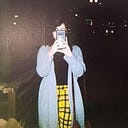No one is named. They are assigned: A Review of Jessica Abughattas’s Strip
I come to Jessica Abughattas’s debut Strip as a fellow poet, a friend, and a Palestinian American from the Los Angeles county suburbs. Despite our many intersections, I feel our differences so distinctly in the way that I love her work.
I am attached to this collection in the way that a kid from the Inland Empire feels attached to the city — something I am aspiring to, something special to visit, something I want to blast loud music in anticipation of. Reading Strip is reading a collage of nights strung together, memory peaking in and out, vast and massive like the city itself — I want to visit this book and all of the places it takes us again, and again, and again.
Strip opens with a “Dinner Party,” and Abughattas sets the tone with a cast of characters with whom we enter her work. We are in Chicago, among the well-to-do, among artists.
No one is named.
They are assigned.
The director, the hostess, the Palestinian, the Bulgarian, the babies from Uzbekistan. We are not in Hollywood, but we could be in a whodunnit, glamorous in our camp. The poem’s strength comes from its disjointedness, echoing the clamor of a dinner party; a dozen conversations overlapping, moment constantly being reconstructed with minor details finding their way back into the story. Between moments of lightness, we are introduced to a cavalry of characters, our access to their stories twisting alongside the details of the evening; for example, the director is: “absent from the table, / is tense when his wife is on set” is “off on a marital dilemma” is “having marital problems” but only after “the scene called for nudity / an intimacy coach was brought on set.”
This constant re-invention and re-phrasing occurs with other characters in the poem, and after the director I am most fascinated by the oscillating between “the Palestinian.” and the “I” in the poem; these moments, for example: “The Palestinian went out into the frost to smoke, / stepped in the tundra dog’s shit” and “We smoke in frost and step in shit”, almost a workshopped version of the former. We know Abughattas is Palestinian, but is she the Palestinian?
The power of naming is deeply complicated. To be stripped of identification outside of your ethnicity is to be targeted. In literature, it’s to be stereotyped, reduced. To be Palestinian, however, is often to be stripped even of the ability to name yourself as such.
Abughattas plays with these fragmentations and convergences in identity. There is “the director” and “the young director” who somehow converge, with “I” being a “decent woman” but also smoking, stepping in shit, like the Palestinian. A Palestinian, without an “I”; a Palestinian, traumatically being held. Threads converge, “Nudity was called for. / The Palestinian was humiliated. / … / Not while your wife is on set.”
Recollection in “Dinner Party” mimics traumatic memory itself. Its oscillating perspective, its patchworked details — finding visual cues in the whodunnit. The way the speaker both isolates herself (speaking in the first person) and implicates herself (smoking, the shit) is brilliant. Abughattas threads aspects of her identity — Palestinianness, her womanhood, her artistry — and attempts to hold them separate, which the poem concludes as impossible. It’s a reminder that each part of us goes into everything we write — the Palestinian does not need to mourn Jerusalem in order for a poem to be a Palestinian poem, the girl does not need to face violence in order for the poem to be one of girlhood. However, despite the poem’s conclusion that these threads cannot be severed, there is also a conflict in their intertwining; “Dinner Party” sets the stage for the rest of the collection both thematically and formally, with its performance, its anxiety, its Arab girlhood, and its interruptions.
Along with girlhood, fear and death follow. “13 Ways of Looking at an Arab Girl,” one of the more underhandedly brilliant poems, surrounds devastating blows with wry humor. Abughattas utilizes the list form wonderfully, letting both tones exist alongside each other without overwhelming the poem itself. A playful line deals with the question of autonomy we face, as if there really is a mode of patriarchy to prefer:
7. I don’t know which I prefer / to be a child in my father’s house / a servant in my husband’s / or liberated by a / fashion / magazine?
In the same poem, however, Abughattas calls on the legacy of Arab women being on the frontlines of domestic protection, with the elegant “Have you seen the brown-necked raven/who builds a home inside a bomb shelter? / The laughing dove who nests in olive trees?”
Most spectacularly, blending this humor and this weight, is the line “I am given the name of an American cheerleader. I am / fearfully made,” its energy echoed in “The Wedding” which concludes with the gut punch: “Your parents were young. Your father / loved your mother, and she was afraid.” Abughattas captures the complexities of Arab girlhood, an existence that is as brave as it is terrified.
In the introduction, Joudah and Charrara introduce Abughattas’s work through the speaker’s various identities; tying these identities is this performance, living confidently, messily, and playing with the semblance of party memoir that Eve Babitz’s presence on the cover might inspire. While I find Babitz’s writing generally shallow, Abughattas’s performance, on the other hand, is as cool as it is vulnerable. The cozy admission in “Legalization,” “I’d rather be braless / in bed until the sun is completely gone / most Saturdays” along with the striking moment in “Little Dume,” “It infuriates me that he’s good / at living,” Abughattas pulls incredible weight in little moments, these two lines emblematic of it.
“Semantics” is the poem I spent the most time with. Previously published by Tinderbox poetry, the original was a beast — a recursive exercise in the actually-ing and hmmm but the other side-ing in the naming of a Palestinian. Its book version is stripped down into ten, unfinished lines interrupted by breaks. In both versions, the poem concludes “When my grandmother is tired / A swallow flutters from her throat;” in the longer version, I read this as the exhaustion the poem produces — the semantics of it all, the explaining, the justifying, makes us grow weary. In contrast, the book version is about constriction, about the stealing of a finished line — the explanation, the repetition are gone. Also stripped is the stunning confidence of naming Palestine towards the end:
Say it for the middle school teacher who made a point
of mispronouncing my last name: Palestine.
Say it for the U.S. census that calls us white: Palestine.
Say it for the stuttering newscaster: Palestine.
Say it for the bumbling history professor: Palestine.
Say it for the Biblically challenged: Palestine.
Say it for the little child born in a manger: Palestine.
Say it for the people in the back row: Palestine.
Say it for the people in the front row: Palestine.
Say it and say it again and again, the letters
becoming softer in your mouth.
falasteen, ya bladi (from Tinderbox)
The book version conjures its exhaustion instead from its retractions — the ghost of the phrases, whether you know what was once there, whether you can infer what could have gone there — in a way simulating the silencing of, once again, naming and identifying with Palestine; the long-text version of “Semantics” is confident, even in its length and explanation — this, maybe, is an ingenuine experience, to be able to articulate all of the histories and connections and solidarities we encounter when our Palestinianness is challenged. While it once relied on associative logic, this new version of “Semantics” relies on the book itself.
The stunning confidence of the Tinderbox version can be found, instead, in the closing poem, “When Almaza Became the Earth.” Abughattas presents a version of a return narrative, something so common in Arab-American literature and so weighted for Palestinians; Abughattas does not travel directly to the homeland, rather, affirms her presence in its legacy through ancestry:
Go find my great-grandmother’s grave in Bethlehem.
Go find my name in stone.
Tell her my hands take the same shape as her hands:
Hands that held my grandmother as a baby,
Hands that rolled taboon bread
Hands that my grandmother kissed then folded
In a coffin when her mother became Earth.
Her hand’s her land.
Go and tell her the news: she is risen.”
The associative logic gone from “Semantics” returns in the imperative, the confidence ingraining herself both through familial legacy and into the land.
Strip hits the same part of my pleasure centers that a Mitski song does; I’m sad, I’m speculative, I’m imagining so many different lives. As a Palestinian writer, sometimes I am afraid no one will care what I have to say outside of my marginalization — every poem must be about the occupation, must be about expulsion. I fear in reading Abughattas’s work, I’ve zeroed in on those moments, despite poems like “Love Lyric” and “Litany for My Father” fitting just as well into her poetic framework. There are poems that engage with sex or queerness or loss that I am holding just as dearly. Much of my reading was focused on this idea of identities, without affirming clearly that there is a full person represented in these pages — perhaps the most impressive feat. Strip shines with its specificity. I love this book with its definitions, for how it grounds itself, for the reality it speaks through. There is nothing comparable.

